She wants women to have good sex. So she started a website where they can talk about it (safely)

Accra, Ghana — “What are your sex and relationship goals for 2019?”That was the question put to women in a blog post published earlier this year in a country that is deeply religious.”I want to give myself the opportunity to feel like a woman and not just someone’s mother,” one reader, Laquo, responded in a blog post.”Long story short, I’m looking forward to some excitingly toe-curling and back-arching orgasmic sexual experiences this year.”It’s the kind of response that would surely please Nana Darkoa Sekyiamah, the Ghanaian writer who posted the call-out on Adventures from the Bedrooms of African Women, the blog she started 10 years ago with a friend, Malaka Grant.Sekyiamah’s interest in sex is less about being salacious (though it’s hard not to blush when reading some of the posts on the site) and more about health, empowerment and community.In the East Legon neighborhood of Ghana’s seaside capital, Sekyiamah’s spacious bungalow sits between much grander properties. Surrounded by family photos, art and literature, she runs her website and works as director of communications for the Association for Women’s Rights in Development, an organization that supports feminist movements worldwide.Sitting down with freshly made smoothies, Sekyiamah, who is in her early 40s, explains that it took her until the age of 30 to feel safe speaking about sex and sexuality with other women. A vacation a decade ago with five other women — where the conversation kept coming back to sex — prompted Sekyiamah to set up Adventures, as she refers to the blog. Its goal is clear, to provide “a safe space where African women can openly discuss a variety of sex and sexuality issues.”Top posts include: an anthology of queer erotic writing; a blog exploring how to send nudes safely (spoiler: there is no foolproof method to avoid your image being used in unintended ways); and the 2011 evergreen post which reveals just how much of a mystery female pleasure can seem: “How can you tell when a woman orgasms?” Sex isn’t hidden from view in Accra. It’s everywhere. But it mostly plays to men’s desires and insecurities.Advertisements played on the radio and signs plastered onto electricity poles and concrete walls offer men remedies to cure “sexual weakness.” In one ad, the man depicted takes herbal medication, returns to peak performance and when asked by his wife what he’d like for dinner, he replies hungrily: “You of course!”Some of the country’s languages and traditions, however, reveal an older, more generous understanding of sex and sexuality. The word supi, for example, refers to an intimate friendship between two girls, which may or may not be sexual. While women from Ghana’s largest ethnic group, the Akan, are said to have grounds for divorce if they are not sexually satisfied by their husband.There are also many programs run by the government and international charities that focus on sexual and reproductive health, but according to Sekyiamah, those programs tend to ignore pleasure.”Within the international development discourse, whenever African women’s sexual and reproductive health is mentioned, they are spoken about as vectors of disease, or the conversation is about needing to control the fertility of African women,” she says.”This discourse leaves out so much, specifically, the importance of African women controlling their own bodies. Pleasure is connected to well-being and so comprehensive sex education is essential to a woman’s full development. If you don’t have control over your body, what can you really have control over?”Kobby Ankomah-Graham has been part of the Adventures community since the blog launched, and he has spoken on discussion panels alongside Sekyiamah, focusing on the role of men and boys.Born to Ghanaian parents and raised partly in the UK but settled in Ghana, Ankomah-Graham lectures at the Accra campus of American higher education institution, Webster University. He’s also written about how much gender roles are changing and how young Ghanaian men seem unprepared for a new, more equal reality.”When you’re privileged and that privilege is taken away, you count that (as) oppression,” he says.”Boys feel hard done by gender equality. Divorce rates are rising in Ghana and one of the reasons is the intransigence of men.”Ankomah-Graham draws on his own personal experience to act as a role model, or at least a conversation starter.”I have a father who has had an interesting life when it comes to women: 12 kids, eight women and four wives. But I’m also the child of a women’s rights activist (anti-female genital mutilation campaigner Efua Dorkenoo OBE),” he says.”I definitely identify as a feminist so boys can see this as possible. I try to explain to them that we have such a long way to go, that they should be thinking about the fact that they are going to compete with women in the working world. They need to be ready for that in ways their fathers weren’t.”Maame Akua Kyerewaa Marfo is the kind of woman Ankomah-Graham is preparing his male students to meet.”I’m seen as this feminist loud-mouth but I have the most boring sex life,” she says with a laugh. “I’m a virgin.””It’s not for religious reasons,” Marfo adds quickly.After struggling with low self-esteem, the singer, who is also one of the organizers of Accra’s Young Feminist Collective, explains that open conversations about sex and sexuality helped her on a journey to self-love and now she’s wary of who she shares intimate space with.”I’ve always been this black plus-size, dark-skinned girl, told ‘you could be so beautiful’ since I was 13 or 14. The amount of self-loathing that that can put into a body is an astronomical,” she says.”For me, sex positivity was thinking about how can I take this body back from everyone and make it something that I understand as desirable. I’ve spent a lot of time becoming at home in my body, and I feel comfortable inviting other people into that home, but I don’t want to leave my politics at the door.”Given that, according to Sekyiamah, there were no online or offline forums for conversations about sex and sexuality 10 years ago, the Young Feminist Collective, which meets monthly, is evidence of just how much has changed since Adventures went live.Marfo describes the collective as a space for young women, regardless of sexual orientation, to understand that they belong to themselves.”Their bodies are theirs, their sexual pleasure is theirs, and they can share it with whomever they deem they should share it with,” she says.It’s hard not to wonder what it cost women like Sekyiamah and Marfo to be so visible and vocal about women’s sexual pleasure in a religious country and one where homosexuality is a crime. Marfo says she gets trolled “all the time” on Twitter and admits she’s learning to pick her online battles.”Christian fundamentalism is on the rise,” Sekyiamah says, “and there are dangers for physical safety. Queer women in Ghana have to gather privately and quietly and hope that no one tells the wrong person. Sometimes you need to have security at events.”There is evidence to support Sekyiamah’s observations and the inclination towards caution and secrecy among queer women. At the release of a report by Human Rights Watch in January 2018, researcher Wendy Isaack said: “Homophobic statements by local and national government officials, traditional elders and senior religious leaders foment discrimination and in some cases, incite violence.”But in the decade since Adventures began, the success of groups such as Drama Queens — a theater company whose plays address, among other things, rape, consent and same-sex relationships — is proof, says Sekyiamah, that change is happening.The work of debunking myths and influencing culture, one blog post at a time, is slow but Sekyiamah wouldn’t have it any other way. She tells a story of a young woman who came up to her at a literary festival in Nigeria to thank her, saying that Adventures, as far as spaces to learn about sex go, had been “like her mother, her sister, her aunty.””This is the kind of impact I’m interested in having,” Sekyiamah says gleefully. “It’s always been a fear that people would think about Adventures as a site for titillation, and that wasn’t my intention. Of course in reading about sex and sexuality it’s natural to get turned on, and of course we write stories that are sexy, but for me that wasn’t the point. The point is women need to know they have a right to sexual pleasure.”It seems at least Laquo got the message. This story is part of Not Yet Satisfied funded by the European Journalism Centre. Click here for more stories from the As Equals series.







